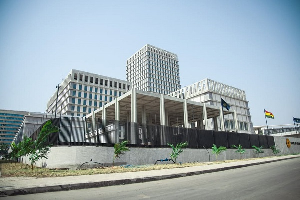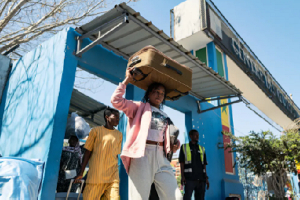Crime & Punishment of Monday, 31 May 2021
Source: Sefakor Fekpe, Contributor
Crime Check Foundation and OSIWA launch project to decriminalize poverty
A project aimed at tackling laws against the poor and vulnerable due to their status has been launched in Accra.
Dubbed, 'Decriminalizing Vagrancy Laws And Advocacy (DVLA), Project,' the Open Society Initiative for West Africa (OSIWA) in partnership with the Crime Check Foundation (CCF) created the initiative to end laws that criminalize the status of individuals.
The vagrancy laws criminalize and bite the living conditions of individuals who are usually poor and homeless.
In Ghana, especially in urban areas, it is common to see hawkers and homeless persons being harassed with vagrancy laws usually not because they have committed a specific crime but because of their status.
Some of these people who get imprisoned return on the streets homeless or trespass to spend the night in abandoned buildings.
Either way, they risk another run-in with the justice system; thus begins the cycle of the criminalization of homelessness.
To break this cycle, the Executive Director Of CFF, Ibrahim Oppong Kwarteng said the CCF-OSIWA DVLA project is expected to create friendly environments by way of educating vagrants to know, demand, and exercise their rights and responsibilities in the country.
While giving details of this in an address, he explained that vagrants were poor persons, without a home, a reliable source of income, or into the practice of a trade or profession.
But sadly, Mr. Oppong Kwarteng disclosed that about 22 African countries including Ghana punished a vagrant, and empower the police to enforce vagrancy laws.
OSIWA, established in 2000, is a donor and advocacy organization
with focus on equality, justice, democratic governance, human rights, and knowledge generation.
The initiative is part of the global network of Open Society Foundations spread across 37 countries around the world.
Chairing the launch of the project on May 28 2021, former Executive Director of Local Government Studies, Dr. Esther Ofei-Aboagye, also supported the initiative while adding that there's the need to decriminalize poverty in Ghana.
She stated that most of these vulnerable people don't know about their rights hence, it is time to ensure there's an enabling environment for vagrants to know, demand and exercise their rights and responsibilities as citizens without fear.
Dr. Ofei-Aboagye acknowledged that it is common to see vagrants being associated with criminal activities which should not be the case.
“Vagrancy and truancy are not in themselves considered to be criminal, but because the concept has been so vague and elastic, it has been open to interpretation and discretion,” she noted.
She expressed satisfaction that bringing on board Metropolitan, Municipal and District Assemblies (MMDAs) to implement the DVLA project is a step in right direction.
“It is imperative that MMDAs clarify their social agenda, especially because there is the level of government that most people in their day to day activities come into contact with,” she said.
Meanwhile, the NGO, poised to prevent crime and wrongful imprisonments, Crime Check Foundation, hopes the project would serve as a vessel to scrap vagrancy laws.
Its Executive Director, Ibrahim Oppong Kwarteng insisted that poverty and ignorance were the key reasons many citizens violate the laws.
“Citizens who violate Metropolitan, Municipal and District Assemblies (MMDAs) bye-laws related to sanitation and traffic offences and are unable to pay fines imposed on them are jailed in the effort of the assemblies to keep the cities and towns clean and safe,” Mr Oppong Kwarteng disclosed.
He expressed disappointment in authorities for their inability to provide shelter for vagrants as required by law.
“A lot of the Assemblies have failed on their mandate to provide places of convenience, dustbins for the citizenry,” he added.
Ratification Of Vagrancy Laws
He also stated categorically that Ghana needs to establish an alternative sentencing regime such as a non-custodial one.
Mr. Oppong-Kwarteng further refreshed the memories of law enforcers on a ruling by the African Court on Human and People’s Rights which spelt out that vagrancy laws that target mainly the poor breach the African Charter on Human and People’s Rights and other international Human Rights Instruments that Ghana has ratified.
Implementation Of Project
He revealed the Decriminalizing Vagrancy Laws And Advocacy project aims to promote human rights and the general well-being of citizens.
He however stated that the project is not to incite vagrants against MMDAs but to drastically minimise the harsh punishments emanating from these bye-laws on ordinary citizens.
“Some of the MMDAs we have engaged have admitted the need to review some of their laws. We appeal to them to caution their task force to desist from assaulting these vagrants,” he said.
Why The DVLA Project?
The increasing number of inmates and their inhumane living conditions in Ghana’s prisons, inspired Crime Check Foundation (CCF) to partner with the Open Society Initiative for West Africa (OSIWA) as the main funder to advocate the annulment of vagrancy laws.
The project's overall target is to decriminalize poverty; thus with the social media hashtag "stop criminalizing poverty."
Project Duration And Target Places
The DVLA project will be implemented in 12 metropolitan assemblies in three regions: Greater Accra, Ashanti, and Central within 12 months.
“We have begun with the mapping, and we are engaging with the various district assemblies in the selected regions and the leadership of vagrants," Mr. Oppong Kwarteng said.
It will sensitize 1200 vagrants about their rights and responsibilities to prevent possible misunderstandings with the assemblies.
“In order not to seem as we are inciting vagrants against the district assemblies and the central government, we will also educate them about their duties as patriotic citizens,” he added.
Monitoring and Evaluation
The Crime Check Foundation said the sensitisation will be followed by the creation of a contact centre to monitor its progress and effectiveness.
It added that this will help address the concerns of vagrants.
The project which started in May 2021, will end in May 2022.
Entertainment

Chez Amis CEO addresses NACOC arrest allegations
Opinions









